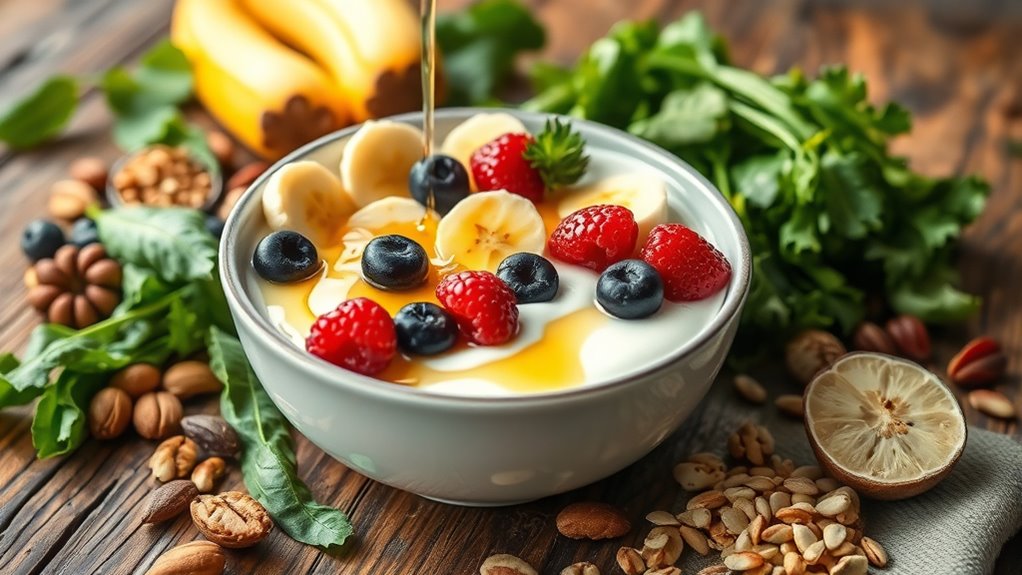Your gut health directly impacts your mood, as trillions of microorganisms in your gut communicate with your brain to influence emotions, mental clarity, and stress resilience. A balanced microbiome helps produce mood-boosting chemicals like serotonin and reduces inflammation that can affect mental health. Eating probiotic-rich foods like yogurt and fermented vegetables, managing stress, and maintaining a healthy lifestyle support your microbiome. Keep exploring how these strategies can help improve your overall emotional well-being.
Key Takeaways
- A balanced microbiome in the gut promotes the production of mood-regulating neurotransmitters like serotonin.
- Consuming probiotic-rich foods supports microbiome diversity, enhancing emotional stability.
- Chronic stress can disrupt gut bacteria, negatively impacting mood and mental health.
- Managing stress through mindfulness and healthy habits helps maintain a resilient gut-brain connection.
- Diet and lifestyle choices directly influence microbiome health, affecting overall psychological well-being.

Your gut and brain are more connected than you might realize, forming a complex communication network that influences your mood, thoughts, and overall health. This connection isn’t just about digestion; it’s deeply rooted in the health of your microbiome—the trillions of microorganisms living in your gut. When your microbiome is balanced and thriving, you’re more likely to experience better mental clarity, emotional stability, and resilience against stress. Conversely, a disrupted microbiome can contribute to feelings of anxiety, depression, and difficulty managing stress. That’s why taking care of your microbiome health is essential for maintaining a positive mood and mental well-being.
Your microbiome acts as a bridge between your gut and brain, sending signals that impact neurotransmitter production, immune responses, and hormone regulation. For instance, certain gut bacteria produce serotonin, a neurotransmitter often called the “feel-good” chemical, which influences your mood and overall mental health. When your microbiome is healthy, it supports the production of these beneficial chemicals, helping you feel more balanced and less overwhelmed by stress. On the other hand, an unhealthy microbiome—shaped by poor diet, antibiotics, or chronic stress—can lead to inflammation and disrupt these signaling pathways, making it harder for you to cope with daily stressors. Supporting microbiome diversity through diet and lifestyle choices is crucial for mental well-being.
Managing stress effectively becomes a key part of supporting your microbiome health. Chronic stress not only affects your mental state but also alters the composition of your gut bacteria, often reducing diversity and encouraging the growth of harmful strains. This creates a vicious cycle where stress impacts your microbiome, and an unbalanced microbiome further exacerbates feelings of anxiety or depression. To break this cycle, you should focus on stress management techniques like mindfulness, regular exercise, and adequate sleep. These habits help lower cortisol levels, which in turn supports a healthier microbiome. Incorporating probiotic-rich foods such as yogurt, kefir, and fermented vegetables can also boost microbiome diversity, making your gut more resilient and better equipped to handle stress.
Top picks for "brain connection food"
Open Amazon search results for this keyword.
As an affiliate, we earn on qualifying purchases.
Frequently Asked Questions
Can Probiotic Supplements Improve Mental Health?
Yes, probiotic supplements can improve your mental health by enhancing microbiome diversity and boosting serotonin production. When your gut bacteria are balanced, they help regulate mood and reduce anxiety. Taking probiotics regularly can support your gut-brain connection, leading to better mental well-being. Just make certain you choose strains backed by research, and combine them with a healthy diet for the best results.
How Long Does It Take to See Mood Changes From Diet?
You can expect a mood shift timeline of about 1 to 3 weeks after making dietary changes, but it varies from person to person. Often, “you are what you eat,” so a positive dietary impact can gradually boost your mood as your gut bacteria balance improves. Stay consistent, as patience is key—your mood may start to lift once your body adapts to healthier food choices.
Are There Specific Foods That Harm the Gut-Brain Axis?
Yes, certain foods can harm your gut-brain axis. You should watch out for excessive intake of dietary toxins like processed foods, artificial sweeteners, and fried items. Fermented foods are generally beneficial, but if they’re contaminated or contain added preservatives, they might disrupt your gut health. Avoiding these harmful foods helps maintain a healthy gut-brain connection, supporting better mood, digestion, and overall well-being.
Does Gut Health Influence Sleep Quality?
Surprisingly, your gut flora holds the key to better sleep quality, not just digestion. When your gut bacteria are balanced, they produce calming neurotransmitters like serotonin, helping you fall asleep faster and enjoy deeper rest. Ironically, neglecting gut health can turn your nights into restless battles, while nurturing it promotes peaceful sleep. So, caring for your gut isn’t just about digestion—it’s your secret weapon for truly restful nights.
Can Gut Bacteria Affect Stress Levels?
Yes, gut bacteria can affect your stress levels. When your microbiome diversity is high, it promotes healthy neurotransmitter production, like serotonin and GABA, which help regulate mood and stress. Conversely, an imbalanced microbiome can lead to decreased neurotransmitter synthesis, increasing your susceptibility to stress. By supporting a diverse microbiome through a balanced diet, you can help manage your stress more effectively and improve overall mental well-being.
Conclusion
Just like the ancient mariners trusted their compass, trusting your gut can guide your mood and health. Remember, the gut-brain connection is a powerful alliance—what you eat can influence how you feel. So, choose your foods wisely, fueling both your body and mind. Embrace this knowledge, and let your gut be the silent navigator on your journey to better well-being. After all, sometimes the best course is set from within.









